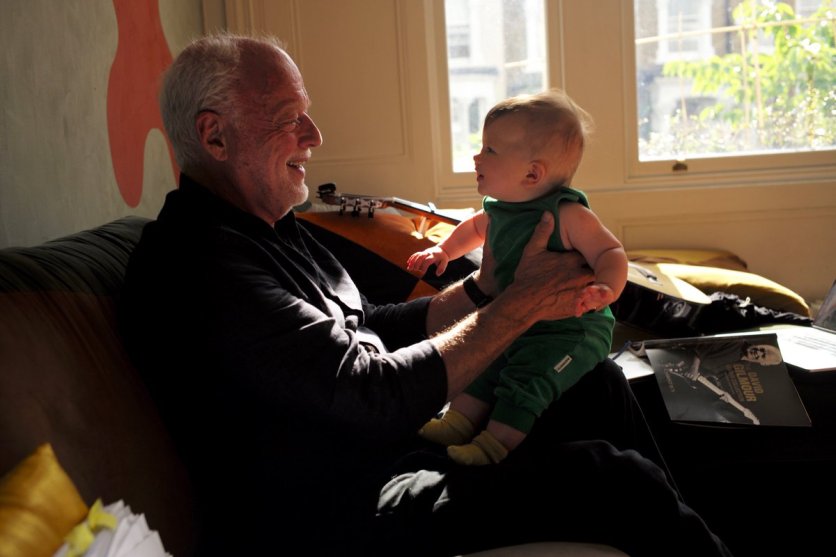
David Gilmour with his granddaughterCourtesy Polly Samson
Welcome to Recharge, a weekly newsletter full of stories that will energize your inner hellraiser. See more editions and sign up here.
Pink Floyd guitarist David Gilmour, stirred by the message of 16-year-old climate activist Greta Thunberg, wanted to do something to improve the world.
But what could he do?
Last week, Gilmour auctioned off his guitars, including the black Fender Stratocaster that helped create Dark Side of the Moon and Shine On You Crazy Diamond. He said goodbye to the 12-string Martin behind Wish You Were Here. In all, he raised $21.5 million—that’s right, $21.5 million.
He gave the proceeds from the most valuable auction of musical instruments in history to a nonprofit that fights climate change.
“The global climate crisis is the greatest challenge that humanity will ever face,” Gilmour tweeted. “We need a civilised world that goes on for all our grandchildren and beyond in which these guitars can be played and songs can be sung.” And then, in a video, he strummed a placid instrumental.
Gilmour donated to a charity called ClientEarth, which takes legal steps to combat climate change.
His grand gesture, applauded worldwide, may have a broader impact, persuading others to swap their mementos for cash to help solve our climate emergency. Readers, what ideas do you have for those of us who don’t have $21.5 million in guitars to help fight climate change? Email me at recharge@motherjones.com. Each of us has something to offer, writes psychologist and Maitripa College professor Dan Rubin.
Here are more Recharge stories to get you through the week:
- Conscientious Cracker Barrel. A Tennessee restaurant turned away the police detective who had called for executions of LBGTQ people when he tried to schedule a church meeting there. The Cracker Barrel shut down the detective and his evangelical group’s event plan, citing its zero-tolerance policy for hate. “We serve everyone who walks through our doors with genuine hospitality, not hate, and require all guests to do the same.” (Knoxville News Sentinel)
- Freedom to read. Arizona’s prison system lifted its ban on a critically acclaimed book on African American men and prisons after a nationwide uproar and an ACLU challenge. “We won!” tweeted author Paul Butler, a former prosecutor and Georgetown law professor whose book, Chokehold: Policing Black Men, had been pulled from Arizona prisons. “This is a victory for the inmate who wanted to read my book, and for literacy and justice,” Butler wrote. “The struggle continues for the 2 million plus souls locked up in the US.” (Arizona Republic)
- His mother knew. Charlie van der Horst’s mom was a Holocaust survivor. When his parents moved to the United States in 1950, they discovered their new nation was also rife with prejudice and hate, he once said. They became active in the civil rights movement, and their son, a noted researcher of AIDS and Ebola, didn’t fear jail time as he fought for the rights of North Carolina residents without health insurance. Van der Horst, 67, died in the Hudson River while swimming in a New York marathon earlier this month. “I think he used his powers for good,” said Dr. David Wohl, who came to the University of North Carolina to work with van der Horst in 1994 and is now a professor of medicine in the university’s Division of Infectious Diseases. Thanks to Jonathan M. Katz for the link. (News & Observer)
- And hey-oh, Ohio: I’ll leave you this week with a waterfall from the Cuyahoga Valley National Park, via the Interior Department Twitter feed. Have a great week ahead!
Purple phlox & forest green add to the summer beauty of Brandywine Falls at Cuyahoga Valley National Park. Pic @CVNPNPS by Anthony Boarman (https://t.co/7u0uZGuWtK) #Ohio #FindYourPark pic.twitter.com/4ESTtd1hxQ
— US Department of the Interior (@Interior) June 19, 2019
Correction: The blooming flower in the Interior Department’s tweet is actually known as dame’s rocket, not a phlox. The difference: A phlox has five petals; dame’s rocket has four.

















